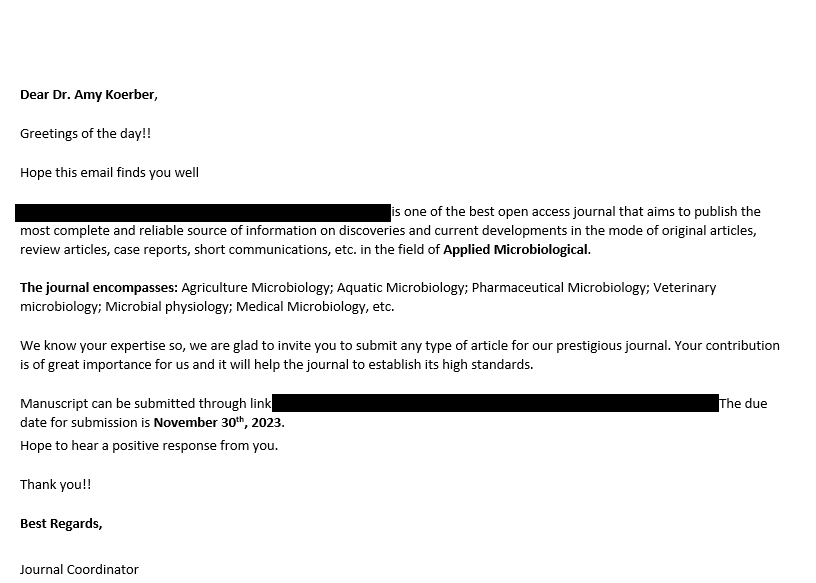The Predatory Paradox: Ethics, Politics, and Practices in Contemporary Scholarly Publishing
By Amy Koerber

Sometime in 2018, my coauthors and I began formulating a proposal to the National Science Foundation’s “Cultivating Cultures for Ethical STEM” program. We wanted to examine scholarly publishing, but it took us a while to arrive at “predatory publishing” as our focus. As a team, we represented a range of disciplines: communication studies, journalism, professional communication, and atmospheric science. Thus, we hardly spoke the same language when we discussed research methodologies, theories, and publishing expectations. However, we had all received e-mails inviting us to submit articles to journals with suspicious titles, sometimes far afield from our own discipline, and promising a rapid review and publishing turnaround.
Of course, such e-mails often include some suspicious features. For example, when they praise the recipient’s “expertise,” that is often an expertise far removed from the focus of the journal. And anyone who clicks on the link to the journal’s website may see additional clues, such as an advertised “impact factor” that cannot be verified through Clarivate’s Journal Citation Reports. Given the frequency with which such e-mail solicitations were arriving in our inboxes, we knew we had found our topic, and we were delighted to learn in July 2019 that our NSF proposal would be funded.
We initially focused on Beall’s list, including various efforts to replace it with a comparable list of suspicious journals, formerly known as journal “blacklists” but now more commonly referred to as “watchlists.” We also discovered a collection of an opposite kind of list, known as “whitelists” at the time, now more commonly referred to as “safelists.” Instead of identifying suspicious journals, these lists itemized journals that could be trusted. The outcome of these early inquiries was published in 2020 as an article in the Journal of Academic Librarianship.
Next, we began conducting interviews—a total of forty-eight interviews with scholarly publishing stakeholders across the globe. Although we had initially planned to travel and conduct these interviews in person, the pandemic hit in early 2020, so we quickly pivoted to Zoom. We were both vexed and intrigued to discover through our first several interviews that “predatory publishing” was not nearly as straightforward as we thought it would be. As these conversations unfolded, we discovered how deeply fraught is the term “predatory.” Whereas many stakeholders in the global scholarly publishing economy stand to gain from the ability to distinguish journals or publishers that are “predatory” from those that are not, we quickly learned that that such an identification was simply not possible.
As we suggest in the opening chapter of The Predatory Paradox, the term itself, “predatory publishing,” is the product of a desire to find simple solutions and understandings to what is inherently a complex problem. As we demonstrate throughout the book’s chapters, it is the same set of demands and changes that have led to many positive innovations in scholarly publishing that have also created a situation in which so-called predatory publishing has come to thrive. These demands and changes include an ever-increasing desire for rapid turnaround from submission to acceptance to publication as well as ever-increasing expectations for scholars across the globe to rapidly produce a high quantity of articles whose quality will be judged, in large part, by the quantity of citations they accrue. We use the phrase “predatory paradox” in the book to capture all the nuance and complexity of this situation.
In so many ways, The Predatory Paradox: Ethics, Politics, and Practices in Contemporary Scholarly Publishing is about things not unfolding as initially planned. Our plan for in-person interviews was thwarted by the pandemic. Our plan to help define the term “predatory” was thwarted by complex conversations that occurred during our interview research. Even our initial plan to develop a comprehensive web-based training program to be delivered to global audiences did not play out exactly as we had planned. Once we began learning about open access publishing and came across Open Book Publishers, it became clear that an open access book, with instructional materials and resources accompanying each chapter, was the more appropriate format to deliver such content.
Thus, we have certainly not answered all the questions we had at the outset of this project. However, we hope The Predatory Paradox will empower scholarly publishing stakeholders across the globe to engage with the array of problems we explore in the book, which are becoming increasingly complex as the scholarly world begins to grapple with new developments such as AI-generated text. We also hope that we have provided a set of tools that will enable readers to embrace the many paradoxes that infuse scholarly publishing today, as a means to individual success and to sustainability for the global publishing enterprise.
The Predatory Paradox: Ethics, Politics, and Practices in Contemporary Scholarly Publishing is an Open Access title available below:





